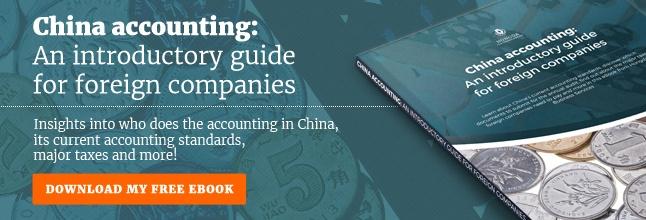VAT tax in China is being cut from May 1st 2018 and, in a country where tax is actually pretty high, this is great news for businesses.
Keep reading as we break down the key changes, and their benefits to foreign investors...
2018 VAT Tax Reforms Are A Drop In The Ocean For China, But A Big Help For Businesses

The May 2018 VAT tax cuts here in China primarily affect certain industrial sectors, namely:
- Construction
- Voice telecoms
- Agriculture
- Manufacturing
- Transportation
These are very wide-ranging and important sectors in China, a country which still continues to build and develop infrastructure at breakneck pace, and so it's expected that many businesses will benefit from the lower VAT rates.
The cost to the public purse is expected to be around RMB 240 billion (US$38.17) per year, a mere drop in the ocean perhaps to the government, but a lot of extra finances for business to reinvest.
How The VAT Rates Are Changing
Two higher VAT tax rates in China are being lowered to a more uniform 16%, 10% (reducing the total number of different rates in operation).
17% and 11% VAT rates applicable to the supply of certain goods and services would be reduced with effect from 1 May 2018 to 16% and 10% respectively. (KPMG)
Even for sectors not outlined above, it seems likely that these new rates will be adopted across all industries in due course.
A Change To VAT Registration Thresholds
The threshold for registering as a general VAT taxpayer (GTP) for businesses is being adjusted too, in what is seen as a good move for many SMEs.
Now the threshold to register as a GTP is being raised to an RMB 5 million per year turnover, whereas in the past is was just RMB 500,000 for industrial companies like small-scale manufacturers, and a slightly higher RMB 800,000 for trading companies.
What this means to SMEs
If an SME, including, say, foreign-owned startups, now fall under the RMB 5 million annual turnover threshold, they will be classed as a 'small scale VAT taxpayer.'
This entitles them to pay just 3% VAT on all of their outputs, but there's no allowance in place to claim back VAT tax credit, and they cannot issue VAT fapiao. Usually, only GTPs can claim back VAT and issue fapiao (VAT invoices), although there are special pilot schemes where this isn't the case.
If you are running an SME and this affects you, you have two choices:
- Become a small scale VAT taxpayer and enjoy an ultra low VAT rate on all outputs, but no ability to claim back VAT on input costs (such as goods you receive) or give VAT fapiao to customers.
- Opt out of becoming a small scale VAT taxpayer by applying to remain a GTP, where you will have the benefits of claiming back VAT and ability to offer VAT fapiao.
Option 2 may well be more suitable to SMEs who deal with customers who expect a VAT fapiao in order to do business with them. This would probably be most businesses, as they too want to claim back VAT on their business input services and goods.
VAT Refunds For Businesses In Specific Industries May Come In A Single One-Time Payment
Gaining back VAT refunds is fairly complex for businesses in China, and can lead to a lot of money being 'left on the table.' Given that these VAT tax cuts focus on certain industries to begin with, it's good to see that VAT refunds will be paid in a single one-off payment to make things more streamlined:
Businesses engaged in advanced manufacturing, qualified modern service companies such as those carrying out R&D services, and companies operating electrical grids will be entitled to a one-off refund of excess input VAT credits accumulated over a specific period of time. (KPMG)
Wrap Up
Overall, it's exciting to see that China is making moves to improve its attraction as a great location for foreign investment and business in general.
The Secretary-General of the OECD, Angel Gurria, praised the VAT reforms, saying:
[China's] tax reforms have been instrumental in supporting economic activity, boosting growth and strengthening China’s international competitiveness, particularly in the services sector. (Gov.cn)
You will be affected by these VAT changes eventually, perhaps sooner rather than later. If you're unsure of what to do, especially in the case of your status as a small scale VAT taxpayer or general VAT taxpayer just click here to get help. Our accounting experts can help you navigate what is best for your business, as well as advising on the best ways to lower your tax burden.
Please leave a question or your thoughts below as a comment, and we'll be pleased to respond.






